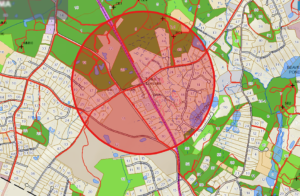(Editor’s note: This article includes a correction to the map supplied to the Lincoln Squirrel that appeared with the January 9 story headlined “New rules ask town to permit 750 housing units in South Lincoln.” The original map misidentified the amount of land that would be subject to multifamily zoning under the new state rules; it has been corrected in that story and also appears below.)

The red circle shows land within a half-mile radius of the Lincoln commuter rail station. Wetlands and buffers are indicated in shades of blue, conservation land is in green, and the beige area in the southwest quadrant is the Mass Audubon Society. The town would have to allow 750 units of multifamily housing within that area to comply with the Housing Choice Act. (Map courtesy of Margaret Olson; click to enlarge.)
Lincoln has not received grants from any of the three state funds for which it may lose eligibility under new state zoning rules, but it stands to lose out on significant amounts of money that one of the funds has already bestowed on other area towns.
The Housing Choice Act requires towns that are designated as MBTA communities to change their zoning to allow multifamily housing with a half-mile of MBTA stops or lose eligibility for grants from the Housing Choice Initiative, the Local Capital Projects Fund, or the MassWorks Infrastructure Program. The act asks Lincoln to zone 50 acres within that radius of the MBTA commuter rail station at 15 units per acre. While the town technically has enough land to comply, “the problem is that the South Lincoln overlay district doesn’t have enough buildable land for 750 units,” Planning Board Chair Margaret Olson said.
Lincoln has never applied for a grant from any of the three specified funds, though it has received funding in the past from other state programs including Green Communities, Complete Streets, a variety of regional planning grants, and most recently $400,000 under the Rural and Small Towns Grant Program for engineering and design of expanded capacity and longevity of the Lincoln Woods wastewater treatment plant, according to Town Administrator Tim Higgins.
The MassWorks program is the largest grant program for infrastructure improvements, and unlike most other programs, it does not have minimum or maximum award amounts. The following nearby towns have recently received MassWorks funds:
- Acton — $2.75 million in 2020 for affordable housing infrastructure improvements
- Harvard — $1 million in 2020 for road safety and drainage improvements
- Marlborough — $2 million in 2019 for improvements to Lincoln Street in support of a $25 million mixed-use development
- Wayland — $2.2 million in 2020 to upgrade its wastewater treatment facility and connect it to the 218-unit Alta River’s Edge housing development at 490 Boston Post Rd.
If eligible, Higgins said Lincoln could conceivably apply for future MassWorks funds to support projects including stormwater improvements that will be required to meet new federal and state requirements, septic system improvements to support whatever South Lincoln redevelopment vision the voters decide to support; Ballfield Road septic improvements (if needed) in support of a community center; water main replacements; MBTA station upgrades; and potentially roadway and roadside path improvements.
Under current state regulations, if Lincoln maintained its current zoning, it would not appear to make the town ineligible for money from Chapter 90, Complete Streets, and a number of other grant programs, Higgins said. (The Chapter 90 program provides funding each year to municipalities for capital improvements to local public roads (usually resurfacing); Lincoln is slated to receive $266,000 in fiscal 2022 from this source.)
The bigger question, Higgins noted, “is whether the town believes its vision is in reasonable alignment with the goals and criteria of the state’s [Housing Choice] program. If the town determines that the density and other requirements of the Housing Choice Act are out of alignment with town values and makes the decision to forego participation in MassWorks, we will need to find alternative funding sources to create/upgrade necessary infrastructure.”
Leave a Reply